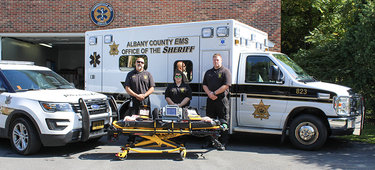No county EMS funding in Berne’s final budget despite agreement
BERNE — The situation around emergency medical service in Berne is no clearer after the town released its final 2025 budget, which does not include any funding for Albany County’s EMS program despite the fact that both the town and county had acknowledged that a deal had been reached earlier this week to ensure that service would remain the same.
Although The Enterprise has not been able to pin down an exact cost to the town, county officials have suggested in their statements that the town is expected to cover at least some of the expense for the necessary service, with county spokeswoman Mary Rozak saying she believed that the total cost to the town would be around $175,000.
Rozak told The Enterprise after Berne published its final budget that she was not aware of any change to the deal and referred more detailed questions to the Albany County Sheriff’s Office, which did not respond to inquiry. Berne Supervisor Dennis Palow also has not responded to queries.
On Nov. 23, after The Enterprise originally published a version of this story, Sheriff Craig Apple wrote on Facebook that despite “concerns” about the town’s budget, EMS in the town will remain “unchanged, and we will receive compensation for these services.”
He goes on to thank Helderberg Ambulance “for their help in resolving the funding gap,” without providing details on how they’ve done so.
Helderberg Ambulance Captain Brenda Dibble could not be reached.
The town has had no presentations or public hearings on the budget since three of the five board members simultaneously quit in August and the governor’s office has named no replacements. Among other complaints, the resigning members said that Palow would not share financial information with them. All five of the board members had run on the GOP ticket.
Palow had originally included $170,000 for county EMS funding in his first tentative budget back in October, but saw fierce backlash from residents over the proposed 19-percent tax increase. In an updated draft budget released earlier this month, Palow struck payments to the county EMS from the budget in order to get the tax increase down to a more modest 2 percent.
He had argued that the county was overcharging the town, and would be forced to provide EMS anyway since the local volunteer squad, Helderberg Ambulance, isn’t qualified to carry out advanced life support, which are life-saving EMS protocols that the county provides to the many towns in Albany County that contract with it.
Albany County Sheriff Craig Apple, who oversees the program, responded to Palow’s claim by telling The Enterprise that the cost to towns is based on census data and that, if Berne refused to pay, he would recommend to county officials that they withhold at least part of the town’s share of county-distributed sales tax.
On Nov. 18, two days before the final budget was due, Palow told The Enterprise that he had met with Apple and struck a deal that would ensure that residents receive the same level of service from the county in 2025 that they’ve relied on for two decades, with county officials confirming that this was true.
All parties, however, were tight-lipped about the exact terms of the agreement. Rozak gave the non-commital figure of $175,000, while Apple’s confidential secretary told The Enterprise on his behalf that Palow “has most of the money in his budget for 2025.”
Red flags
Unlike in previous years or in any other town in the state, Palow is enacting his town’s 2025 budget on his own since he currently lacks a town board to provide oversight, after three of the town board’s five members resigned in August over lack of confidence in his leadership and financial acumen.
The Enterprise has reported extensively over the past few years on the various red flags that have popped up on the financial side of things, from unpaid bills to overdrawn accounts to admonishments from the Office of the State Comptroller.
Palow and other town officials have largely dismissed or denied these issues after they’ve been reported on.
Nevertheless, under Palow, the town board raised taxes by 752 percent for 2024, which made the 19-percent increase this year — whopping in its own right — all the more painful for residents to consider.
The state-set levy limit for municipalities is 2 percent. Going over this cap requires supermajority approval from board members, and is fairly rare in the Enterprise’s coverage area.
Berne has been forced to raise taxes after spending down its substantial unassigned fund balance in the span of a few years, going from nearly $1 million in 2021 to just under $55,000 in 2023, according to data from the comptroller’s office.
Large tax increases, combined with the various other indicators of fiscal stress, suggest to town Democrats — the town has been led by GOP-backed boards since 2020 — that the town is out of money.
This likewise means that, if the town is expected to pay the county for services it’s already contracted for, there’s no obvious place for that money to come from.
If the issue were only that the money was left out of the budget despite there being enough money freed up elsewhere, such as a healthy fund balance, the town could make an authorized transfer.
With less money in the town’s unassigned fund balance than it appears the town would owe, the money would need to be transferred from lines that are already dedicated to other expenses.
Although the deal has not yet been closed, the town is expected to sell Switzkill Farm to the county for $150,000, which would come close to the amount the town may owe the county for EMS, and could be enough to allow the town to close the gap with whatever it has left in its unassigned fund balance.
The Office of the State Comptroller could not immediately be reached for information on what options a town has for raising money after a budget has been finalized.
The county has, in the past, covered for expenses that have been removed from public budgets.
After the Berne-Knox-Westerlo school budget was defeated twice because the salary for a school resource officer pierced the tax cap, the county ended up paying for the SRO at BKW. The money came from funds given to the county through the BusPatrol program, which films drivers illegally passing stopped buses and collects the fines.


